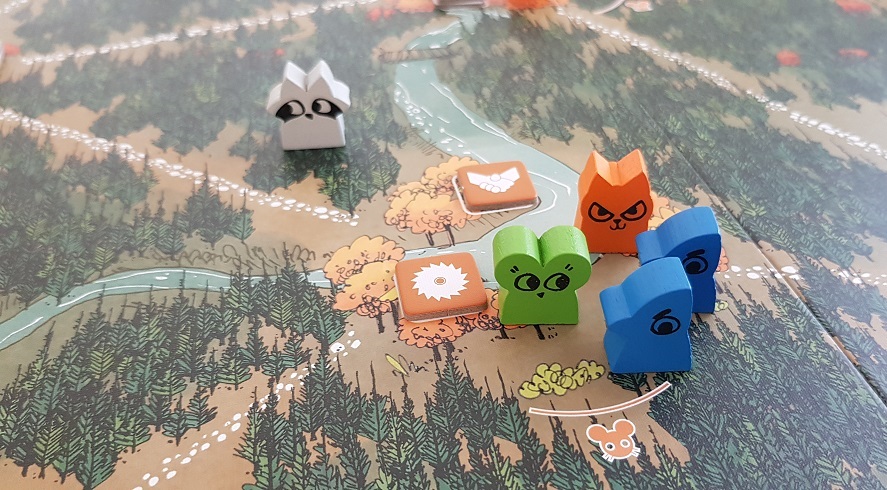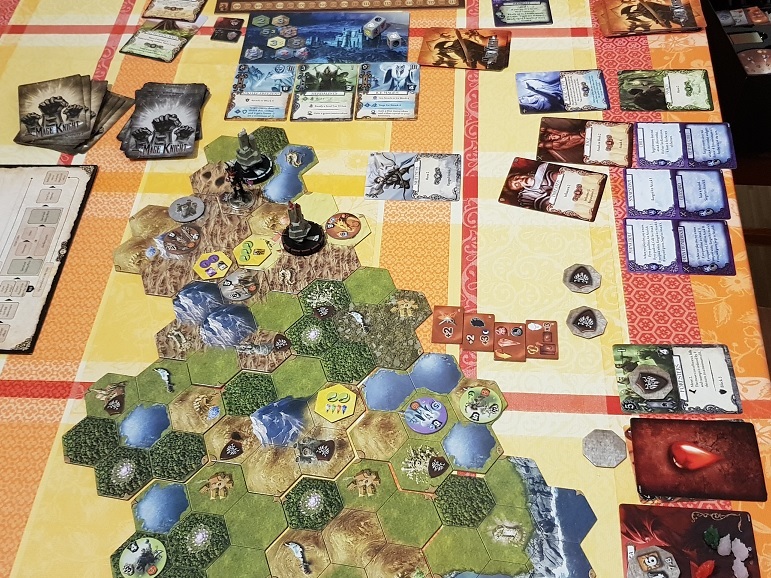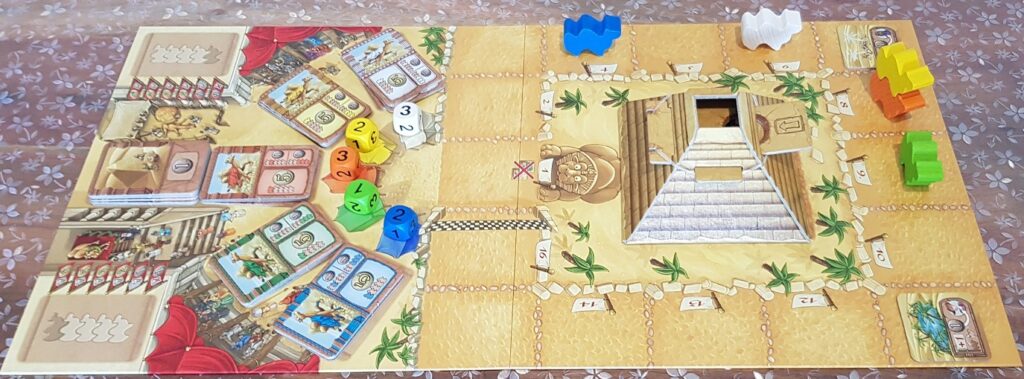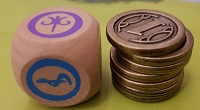These are 5 Reasons about What Makes Board Games Fun. Learn how to better choose a board game for your group from this in-depth article.
What Makes Board Games Fun?
The main factors that determine whether a board game is fun or not are: visuals and feels, meaningful choices, elements of suspense, interactivity, and the group of people you play with.
Theme, immersion, and components.
Humans are first and foremost visual creatures. Phrases like “love-at-first-sight” have a meaning. If you’re visually attracted to someone or something, they will have a much easier task of convincing you to also like and enjoy their other mechanisms.
Or if we traverse back into board gaming waters. If the game is visually appealing and has high-quality components, it will be much easier for you to immerse in it, enjoy its gameplay and have fun.
That said, the theme also plays a significant role. A game like Azul, which is strong mechanically, visually, and in components, might leave some players unengaged because it’s overly abstract – the players can’t identify with anyone in the game.
On the other hand, books are extremely rich in theme and immersion, even though they are just black letters on white paper. So, board games that can recreate such a feeling, either by narrative, or even better, by game mechanics that make thematic sense, will be much easier to identify with.
For example, Scythe fulfills all these elements fully. It’s stunning, the components are tactile (fun to move around), and the world it creates is alive around you. You actually feel like a leader of a post-war diesel-pink apocalyptic nation: because of great art, background story, but also game mechanics that make sense (i.e. mechs can carry workers, building a monument increases your popularity, and so on).
One more note to add about components is that your time behind the table should mostly be spent playing the game, not setting and re-setting the board (I’m looking at you, Hawaii), fiddling with components, and referring to rules.

Deep, meaningful choices.
Board games are normally structured as a series of choices. As you and other players make these choices during the game, the gameplay branches out as a tree, creating an almost infinite number of outcomes.
How your choices affect the outcomes is very important – they must have a meaningful impact on the outcome of the game, otherwise, players will feel unengaged as if the game is playing itself. If you decide to attack a keep rather than interact in the village on the first turn of Mage Knight, this will have a deep-impacting result on the build of your character. But it doesn’t mean either choice is wrong – they’re just two of different possible paths.
For a board game to be fun, it has to have many options and paths you can pursue, with many being equal in value. But choices and outcomes should be clear enough to allow players to decide for one and argue why it was a good choice.
To further clarify my point, imagine a coin flip. You’re deciding on which side to bet. While both choices are of equal value, there’s not much clarity on where they will take you, making your decision pointless and not much fun.

An element of suspense, drama (or a random element) adds a lot to the excitement – but to a certain level.
Alright, this one’s a bit controversial, as it’s quite subjective, but hear me out. A complex strategic game of open information (let’s say Chess, or a more modern example, Gaia Project) has its appeal and draws excitement from long-term planning and the overall optimization of your strategies. That’s where its memorable moments come from – realizing that you planned it just a little better than your opponent.
But to induce those A-ha, got you! or Oh no! laugh-out-loud moments, you need a random element included. Of course, not to a level where the game becomes a crapshoot. Just that little bit to break the stalemate and prevent analysis paralysis.
Perhaps a (weighted) dice roll to determine the outcome of a battle or an encounter, random event cards, and so on. A perfectly timed random event can do a lot to the immersion – think weather dice and encounter cards in Robinson Crusoe, which really make you feel you’re at Mother Nature’s mercy. It will also get hilarious sympathetic (or un-sympathetic) reactions from other players. And these are the stuff that becomes unforgettable memories.
Best Dice Placement Board Games
Game mechanisms should encourage interaction.
When you play a board game with other people, (hopefully) your goal is to bring you guys closer together. It’s not fun being all alone in a corner, trying to figure out the solution to the puzzle. Or even worse, make you do nothing at all, just waiting for your turn. No, you want to be out there with the rest, fighting for spots on the board, role-playing, bargaining, cooperating, obstructing, and socializing.
A lot of this comes directly from game elements and the best games know how to induce it. In Camel Up, you’ll be on the edge of your seat, cheering for certain camels, even though it’s not even your turn. But because you’ve invested your resources before, the game has kept you engaged.
Or if we take another classic, Catan. Even out of your turn, you’ve got things to do. You must keep an eye out on the dice rolls, making sure to collect your resources, and then you can also trade with the active player. All this makes the game interactive for the whole time, thus increasing the fun factor immensely.
More Negotiation Board Games like Catan
The worst the game can do is have a very complex player turn that can, in some cases, take 10 minutes, while at the same time having just enough hidden information (or the board changes just enough before it’s your turn) to prevents you from planning your moves in advance. Some heavy euros suffer from this – it’s no fun twiddling your thumbs for 20 minutes to only be “allowed” to think about your moves when it’s your turn.
Mage Knight is a perfect example. You’ll often have 5-10 cards in your hand with several possible paths on the map, while at the same time you won’t know what mana will be available until it’s your turn, making any planning pretty useless. On the other hand, such a game may be tons of fun in solo mode – and Mage Knight is!

Board games are social events – the people you play with make a difference in how fun the game is!
For the last point (and certainly not the least important) we’ve got people around the table, you included. A good group can make the most even out of an average game, while a bad group can ruin even the best-designed game.
I’ve had dozens of epic games of Risk with my friends. While it’s not a highly rated game and features very simple mechanics, we squeezed every ounce of fun out of its formula. Alliances that lasted the whole game, alliances that broke apart the next, alliances that were made just to harm the third player, non-aggression pacts just waiting to be broken, and so on. All this combined with role-playing, and trash-talking created unforgettable experiences for us.
The contrary can happen if you have narrow-sighted, grumpy players who will only play gems they like. If you bring something lighter, it’s too simple for them and they will keep reminding you about it the whole session. With one wrong die roll, they become unhappy and complain, bringing the whole table down.
Or you try to introduce them to something a bit more complex, and they keep nagging about how the game is hard to learn, they can’t remember the rules, why it has to be so fiddly, I’d rather play this other game, etc. Even if the game is well-designed by all other criteria on this list, just one such player can ruin the fun for everyone else.

Yes, playing board games is fun and it can bring people closer and more happiness, increases brain function, and etc.
It’s true. 🙂
Interesting article, point 5 is something I noticed and it’s completely true.
I want to make a game. Trying to sort out how to make it fun. Thanks for this. I would love to work with others on this project. Shoot me an email if interested. I can’t give away the idea on here as i am a little worried it could be stolen.
If you would like to discuss something privately, you can always mail me at vasilij@victoryconditions.com.